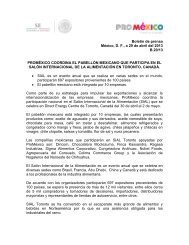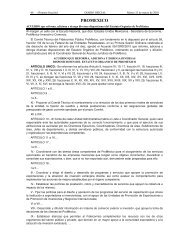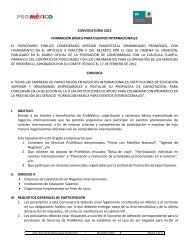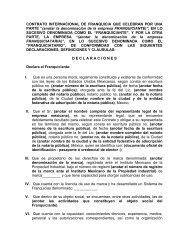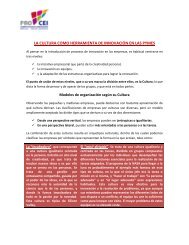mexico renews itself - ProMéxico
mexico renews itself - ProMéxico
mexico renews itself - ProMéxico
You also want an ePaper? Increase the reach of your titles
YUMPU automatically turns print PDFs into web optimized ePapers that Google loves.
42 Negocios ProMéxico Negocios ProMéxico 43<br />
Kyocera’s production<br />
complex in Tijuana is<br />
the company’s chief<br />
manufacturer of solar<br />
modules for North America;<br />
and the plant’s production<br />
capacity will continue to<br />
grow as demand for solar<br />
energy increases.<br />
Kyocera’s Pioneering Solar Energy<br />
Business Gears up for Further Growth<br />
Mexico plays a strategic role in Kyocera’s solar<br />
module manufacturing plans, not only as a<br />
production hub but also as a potential growing<br />
market for the company’s solar solutions.<br />
____<br />
photos courtesy of kyocera mexicana<br />
You may be familiar with Kyocera, a Japanese manufacturer<br />
of microelectronics packaging, industrial ceramics,<br />
cutting tools, solar panels, cell phones and office<br />
equipment. What you may not know is that Kyocera<br />
boasts a rich history of operations in Mexico, since Kyocera<br />
Mexicana began manufacturing products in Tijuana, Baja California<br />
in 1989.<br />
Kyocera Mexicana has proved successful with a variety of<br />
manufacturing processes in the past 23 years. The company’s<br />
hard-working employees in Tijuana have helped improve<br />
yield, reduce cycle time and lower defect rates on some of<br />
Kyocera’s most important products by executing complex<br />
technology transfers, adhering to the core principles of continued<br />
process improvement and maintaining a “customerfirst”<br />
attitude.<br />
“Tijuana has played a key role in Kyocera’s expansion, thanks to<br />
its pool of talented employees who have a strong commitment to<br />
producing high-quality products,” says John Rigby, President of Kyocera<br />
International, Inc., the firm’s San Diego-based North American<br />
headquarters and holding company. “Support from Mexican<br />
leaders and employees has made us stronger, and allowed us to serve<br />
more customers with high-value-added manufacturing.”<br />
One of the latest success stories at Kyocera’s Tijuana facility is<br />
solar module manufacturing.<br />
Kyocera has been in the renewable energy business since the<br />
1970s, when Dr. Kazuo Inamori started researching sapphire<br />
crystal-growth technology and photovoltaic cells. Inamori, who<br />
had founded Kyocera in Kyoto, Japan in 1959 as a producer of<br />
advanced ceramics, believed crystal-growth technology could be<br />
applied to growing silicon crystals. When the OPEC oil embargo<br />
brought the global economy to a standstill in 1973, he became convinced<br />
that renewable energy would become a global imperative.<br />
Inamori’s instincts were spot on. By 1979, Kyocera had become<br />
the first company in the world to successfully deliver silicon<br />
crystal-ribbon solar cells using the Edge-defined Film-fed Growth<br />
(EFG) method.<br />
Over the years, Kyocera has developed production processes<br />
and in-house quality evaluation systems that allow the company to<br />
ensure high quality at every phase of manufacturing.<br />
In 1982, the company was the first to mass-produce multicrystalline<br />
silicon solar cells using the casting method, which is<br />
now the main technique used throughout the world.<br />
This year marks the 37th anniversary of Kyocera’s involvement<br />
in solar energy. Global demand for clean energy has created an explosion<br />
of new companies in fields ranging from geothermal power<br />
to biofuels. Although expectations are high, only a few companies<br />
worldwide have a long tradition of providing reliable renewableenergy<br />
solutions. Kyocera is among the most notable.<br />
Kyocera began solar module production in Tijuana in 2004.<br />
In 2007, the company broke ground on a new, large-scale facility<br />
there as part of an aggressive plan to more than double its annual<br />
solar module manufacturing capacity. The resulting world-class<br />
production center –a two-story plant with 223,000 square feet of<br />
production space– was inaugurated in 2009.<br />
In 2010, the facility put the icing on the cake by installing a<br />
100-kilowatt solar electric generating system on its roof. Now,<br />
in addition to manufacturing solar panels in Tijuana, Kyocera is<br />
producing clean, renewable power that flows directly from the sun<br />
through its solar array and into the power grid.<br />
Today, this high-tech production complex in Tijuana is Kyocera’s<br />
chief manufacturer of solar modules for North America;<br />
and the plant’s production capacity will continue to grow as demand<br />
for solar energy increases.<br />
Global Expansion<br />
Solar energy growth is inevitable. With more than 1.6 billion<br />
people worldwide lacking access to electricity, few technologies<br />
are in greater demand. Making solar energy more affordable is a<br />
matter of enhancing technologies, raising the energy conversion<br />
efficiency of solar cells, and increasing mass production volumes.<br />
Kyocera has developed a global production framework to manufacture<br />
solar panels near major markets, thus minimizing the<br />
environmental impact and costs of shipping bulky solar modules<br />
from manufacturer to installation site. The company’s Tijuana<br />
facility supports US, Canadian and Mexican markets with its highquality<br />
manufacturing processes.<br />
Solar power offers a hedge against the rising cost of electricity,<br />
and serves as an environmental countermeasure to acid rain, ozone<br />
layer depletion and rising carbon levels. The US Environmental Protection<br />
Agency (EPA) estimates that each gigawatt of fossil-fuel electricity<br />
replaced by solar power will reduce carbon dioxide as much as<br />
a forest covering about 289 square miles.<br />
Due to their high reliability and efficiency, Kyocera modules<br />
have been employed in various installations ranging from utilityscale<br />
power plants, public and industrial facilities to residential<br />
homes in virtually every nation of the globe.<br />
“People all over the world are demanding an energy source<br />
that’s affordable, reliable and safe for the environment,” says Steve<br />
Hill, President of Kyocera Solar, Inc. “Thanks to the quality and<br />
dedication of our colleagues in Tijuana, that is exactly what Kyocera<br />
delivers.”<br />
While most of the panels Kyocera builds in Tijuana are currently<br />
exported, the company believes strongly in the potential<br />
of Mexico’s solar market. “Kyocera is ready to serve this robust<br />
market with cost-effective solar solutions, so Mexican consumers<br />
can enjoy clean, renewable energy from the sun,” concludes David<br />
Hester, Kyocera Mexicana’s President. n<br />
www.kyocera.com



